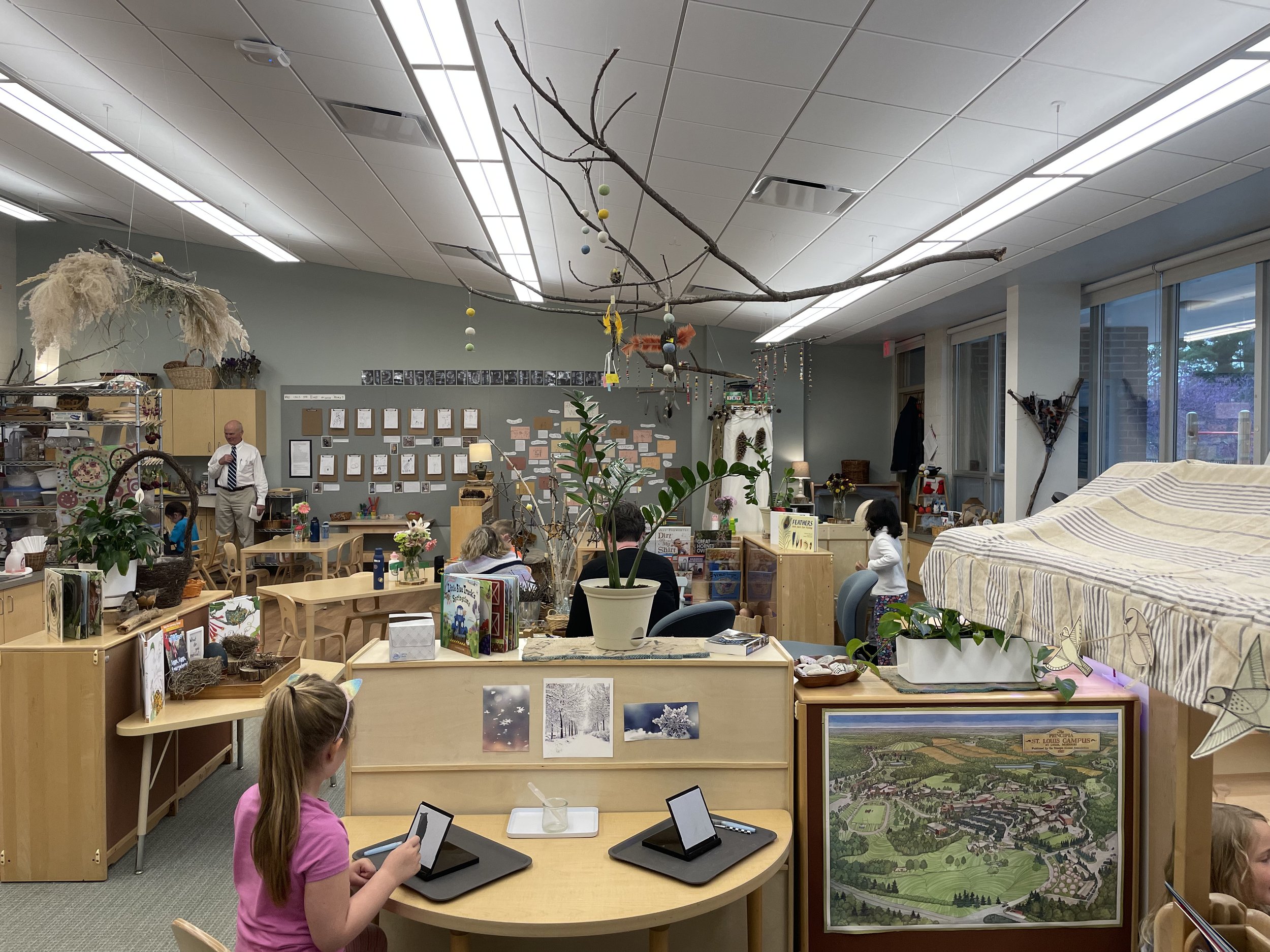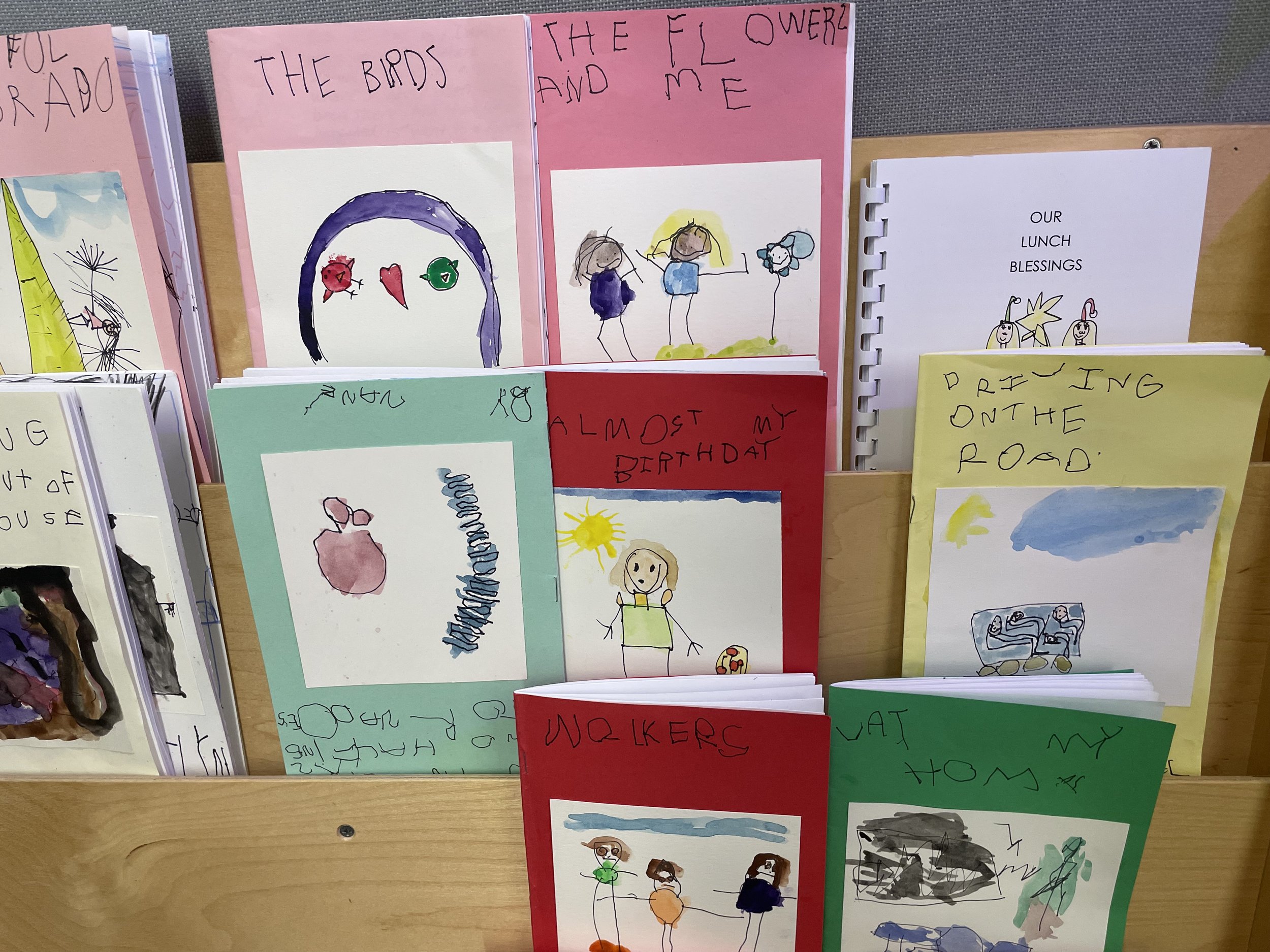Preschool classroom, Principia Early Learning Center
At the end of the 2023 school year, we completed our longest working relationship with any school…Principia School in St. Louis, Missouri. We became close colleagues with the principal, Dorothy Halverson, the ateliierista, Louise Elmgren, and many of the teachers over the eight years that we worked alongside them to integrate Reggio-inspired practices into their way of being and learning in school with children. Last spring, Georgia Mae Harrison wrote an article for the fall 2023 issue of the Principia School alumni magazine, Purpose. What follows are excerpts and adaptations from that article. Reading it provides a lovely way to look back on our years of work with them and to be grateful again for their collaboration and their friendship.
An Enrollment Dilemma
In 2008, facing a struggling economy and low enrollment across all levels of the school, Early Childhood Principal, Dorothy Halverson was searching for ways to attract more families.
It turns out, the answer to that dilemma was the Reggio Emilia approach.
The Reggio approach is a child-centered and collaborative approach to early childhood education. Originating in Reggio Emilia, Italy, it emphasizes the child's innate potential and curiosity. The natural environment is seen as a "third teacher," designed to inspire exploration and creativity. Teachers act as co-learners, fostering critical thinking and problem-solving. The approach values diverse "languages" of expression, including art, music, and movement, to encourage communication and understanding.
Preschool classroom, Principia Early Learning Center
Collaboration among children, educators, parents, and the community is essential. The Reggio approach promotes a strong sense of community, self-expression, and a lifelong love for learning, nurturing children's social and emotional development through play and creativity.
Louise and Ashley Cadwell from Cadwell Collaborative (a pair of consultants specializing in the Reggio Emilia approach) worked with Principia for eight years, and noted what stands out about the faculty working in the program: “There are a number of schools that have beautiful woods and grounds that the children rarely visit. The teachers at Principia think nothing of putting on raincoats and boots with children and going for a walk in the woods.” Acorn teacher Heather Buchanan noted, “It isn’t just about playing outside. How do we extend the learning? We are a mediator in their learning. We are constantly prompting them to think deeper about what they are seeing, ‘What would happen if....?’ ‘Why do you think that is...?’”
“We can’t teach our kids to sustain and care about our earth if they don’t know about it,” remarks Halverson.
Nine years into its Reggio Emilia implementation, the early childhood classrooms and waitlists are full—a testament to the impact of the Reggio approach and Principia’s stellar staff. Prospective families are drawn to the nature-inspired learning, collaboration, and sense of community among students, educators, and parents. Kara Moe, a parent with two children attending the ELC, noted that she was drawn to Principia by the big open spaces and natural light pouring into the classrooms, “I think that was the biggest difference from the other preschools that we toured. The children’s work inspired by the natural world was hanging in the hallways. I just loved that.”
During Principia’s time working with Cadwell Collaborative, Louise and Ashley Cadwell worked in partnership with the teachers to strategically compose their classrooms to ignite students' curiosity and enthusiasm for learning. The transition involved a deliberate shift away from plastic toys and bins, favoring the use of natural materials to foster open-ended exploration.
In Patti Matthys-Pearce’s classroom, where she engages with infants and toddlers, the principles of the Reggio approach are enthusiastically embraced. Matthys-Pearce watches as 12–24 month-olds take initiative in their learning, for example, working with potters clay for 40 minutes at a time, totally enveloped in the play—a testament to the profound impact of these Reggio-inspired changes.
There is a remarkable connection of shared values between Mary Kimball Morgan, Mary Baker Eddy, and the founders of the Reggio Emilia approach. Each recognized the inherent potential and capabilities of children, embracing the conviction that they are capable learners from the very beginning—vessels already full and complete.
Having garnered a reputation as an exceptional Reggio Emilia-inspired school, Principia is inspiring other schools around the world. When Cadwell Collaborative featured Principia in their blog, it caught the attention of an esteemed school in Brazil. Upon seeing the captivating photos and insights shared about Principia's practices, they showcased them in their own outreach efforts.
Conversations with teachers at Principia Early Learning Center
Principia's program has also made waves locally. The School's innovative approach has piqued the interest of nearby universities and schools, prompting them to request tours and classroom observations. This resonance within the educational community stands as a testament to Principia's remarkable impact and its role as a source of inspiration for educators worldwide.
Last spring, The Early Learning Center and Preschool Principal, Dorothy Halverson, and Preschool/Lower School Art teacher/Atelierista, Louise Elmgren, participated in "The Reggio Emilia Approach to Education" conference in Italy in April 2023. Over 400 educators from 27 different countries joined the 50-hour International Study Group—a deeper investigation of the concepts, values, and content learning of the Reggio Emilia Approach.
"We had the opportunity to connect with pedagogisti, atelieristi, administrators, and teachers who work in Reggio Emilia’s infant—toddler centers and preschools," Dorothy remarked. What an extraordinary opportunity for Principia teachers and administrators to deepen their understanding and practice of the Reggio approach.
At the core of Principia’s program is a deep sense of respect and love for each child. Halverson states that their mission is for every student to leave feeling loved. Kate Booher, an ELC parent, can attest to this. Booher herself is an educator and teaches in another local Reggio Emilia-inspired school in St. Louis. At Principia, she says, “The way they talk about my child, even on a hard day for him—they describe his interactions with so much love and empathy, and reassure me that whatever he is experiencing is a beautiful part of life. They really focus on his wonder and awe in nature. It is so evident in the videos and photos we see of him at school and the way he is exploring at home.”
Louise Cadwell's profound words from her book, Bringing Reggio Emilia Home: An Innovative Approach to Early Childhood Education, strike a chord with the core philosophy at Principia’s Early Learning program and Preschool. “Education begins the moment we see children as innately wise and capable beings. Only then can we play along in their world.” The educators at Principia have wholeheartedly translated this principle into practice. Their mastery in creating an environment that recognizes and nurtures children's potential is evident in every aspect of the school. By engaging in the children's world, they have crafted a transformative learning experience that leads young learners to thrive—and, above all, to feel deeply loved and valued. What more can you ask for these future leaders of our world?
Stories written and illustrated by students, Principia Early Learning Center




